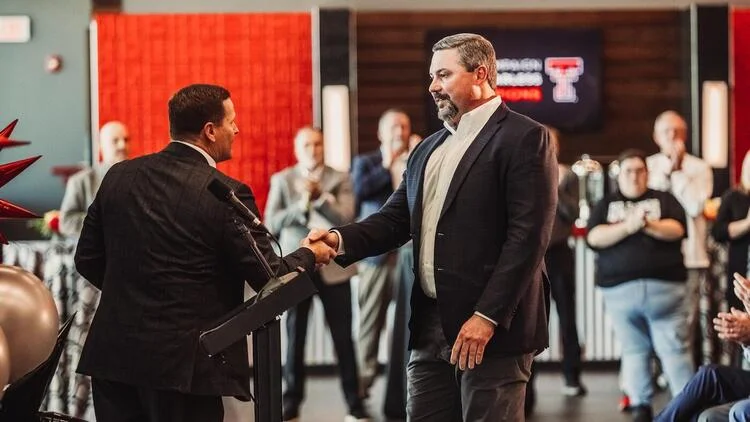CBS Sports’ Shehan Jeyarajah took a trip to Lubbock to dive into Texas Tech’s all-in NIL gamble—and the billionaire behind it, Cody Campbell.

LUBBOCK, TX — In the evolving world of college athletics, where NIL (Name, Image, and Likeness) deals are reshaping rosters and redrawing traditional lines of influence, Texas Tech University has emerged as one of the most aggressive—and audacious—players in the game. And at the center of the Red Raiders’ high-stakes strategy stands a familiar West Texas name: Cody Campbell.
In an exclusive, in-depth feature, CBS Sports’ Shehan Jeyarajah traveled to Lubbock to uncover the full scale of Texas Tech’s NIL revolution, spearheaded by Campbell, a former Texas Tech offensive lineman turned energy mogul. The story, both remarkable and revealing, outlines the deliberate financial gamble the Red Raiders are making to build a national contender—fueled by Campbell’s millions, unwavering loyalty, and unrelenting belief in West Texas football.
“This isn’t just a donation,” Campbell tells Jeyarajah in the piece. “It’s an investment. Not just in athletics—but in Texas Tech, in Lubbock, and in the future of college football.”
Cody Campbell, co-founder of Double Eagle Energy Holdings and a former All-Big 12 lineman under Mike Leach, has emerged as arguably the most influential booster in Texas Tech history. After selling Double Eagle for nearly $6.5 billion in a series of deals across the Permian Basin, Campbell turned his attention—and wealth—back to his alma mater.
In 2021, he made headlines with a $25 million donation to Texas Tech athletics, the largest ever at the time. That figure, however, was only the beginning.
As Jeyarajah reports, Campbell has since committed more than $100 million in total NIL and facilities support—positioning Texas Tech as a surprising leader in the national NIL arms race, often outpacing richer, more historically dominant programs.
“He’s not just writing checks,” one athletic department official said. “He’s building a blueprint.”
At the core of Tech’s NIL strategy is The Matador Club, a nonprofit-style NIL collective partially funded and organized by Campbell and other key boosters. Its stated mission: to provide monthly NIL stipends and performance-based bonuses to Texas Tech football players and athletes in other sports.
Unlike flashy, individual endorsements that characterize many NIL deals elsewhere, The Matador Club focuses on roster-wide impact, ensuring that walk-ons and backups are compensated alongside stars.
In 2023 alone, the club reportedly paid $25,000 to every football player on the roster, including walk-ons—a figure confirmed during Jeyarajah’s reporting. That same year, they expanded to men’s basketball and baseball, with plans to reach women’s athletics by 2026.
“It’s about equity. It’s about sustainability,” Campbell says. “If NIL is going to last, it can’t just be for the quarterbacks and edge rushers.”
The strategy has drawn both praise and serious skepticism from the national media and other athletic departments. Critics question the sustainability of blanket payments, the ethical structure of NIL nonprofits, and the legal tightrope Campbell and Texas Tech are walking in a landscape still defined by NCAA ambiguity.
“It’s like a venture capital play,” said one Big 12 compliance officer, who spoke anonymously. “The reward could be huge, but the risk? Massive. Especially if the courts or Congress intervene.”
Campbell and Texas Tech officials remain unfazed. As Jeyarajah notes, Campbell’s position isn’t built solely on legality—it’s about being first, being bold, and making Texas Tech impossible to ignore in a fragmented college football ecosystem.
In terms of on-field success, the results have been mixed—but promising. Under head coach Joey McGuire, the Red Raiders finished 7–6 in 2023 and 6–7 in 2024, with strong recruiting classes but inconsistent results. The hope internally is that 2025 will bring a breakout year, with NIL now a central tool in retaining talent, luring elite transfers, and building depth that Texas Tech traditionally couldn’t afford.
“Guys aren’t leaving anymore,” a team source told CBS. “You used to lose half your two-deep to the portal. Now? They’re staying—and they’re getting paid.”
Several recent high-profile recruiting wins have also been directly tied to The Matador Club’s reach, including 5-star linebacker Reggie Vaughn and former Michigan wideout Caleb Tatum, who transferred to Tech in January 2025.
“It’s not just about money,” Tatum said in the story. “It’s about knowing the program has your back.”
Interestingly, not all Tech fans are on board with the all-in approach. Some traditionalists have expressed concern that the university’s academic priorities and long-term institutional integrity are being overshadowed by athletics. Others worry about dependency on a single mega-donor.
“There’s too much Campbell, not enough Tech,” one anonymous faculty member said. “What happens when he’s no longer interested—or if the law changes?”
Campbell, however, dismisses the idea that he’s hijacking the school’s identity.
“Everything I’ve done has been in lockstep with university leadership,” he told CBS. “This is a partnership. We’re building something bigger than any one donor or coach.”
Jeyarajah’s story also touches on Campbell’s long-term plan to reshape Texas Tech’s athletic identity across all sports. In addition to NIL infrastructure, Campbell has backed an $80 million renovation of Jones AT&T Stadium, the construction of a new sports science and performance lab, and the hiring of data analytics staff to give Texas Tech a competitive edge.
Women’s sports are also part of the plan. The Red Raiders are reportedly developing NIL initiatives for softball, volleyball, and women’s basketball—an intentional move that sets Tech apart from schools that have been criticized for gender imbalance in NIL benefits.
“This isn’t about football,” Campbell says. “It’s about Texas Tech winning across the board.”
As Tech surges forward, legal and regulatory clouds loom. A growing number of lawsuits are challenging the NCAA’s ability to govern NIL, while Congress debates legislation to impose federal standards.
If new rules cap or centralize NIL spending, programs like Texas Tech—whose competitive model relies on unrestricted donor-backed collectives—could be at risk.
Jeyarajah poses a pointed question in his piece: Is Texas Tech building a skyscraper on sand?
Campbell’s answer is blunt.
“If it changes, we’ll adapt. But I’m not going to sit on the sidelines waiting for Washington to figure it out. This is college football. You act—or you get left behind.”
Whether Texas Tech is forging a new NIL blueprint or engaging in an unsustainable arms race remains to be seen. But one thing is clear after Jeyarajah’s deep dive: the Red Raiders are no longer playing it safe.
They are betting big.
They are betting now.
And they are betting on Cody Campbell.
The billionaire energy magnate who once paved holes as an offensive lineman now paves the way for a new kind of college sports era—one where belief, branding, and bankroll collide on a stage no longer defined by tradition, but by boldness.
As Campbell tells Jeyarajah in the story’s final quote:
“I’m not trying to match what Alabama or Ohio State does. I’m trying to make Texas Tech the place nobody saw coming.”
And in Lubbock, at least for now, that gamble is paying off in bold headlines—and even bolder hope.









